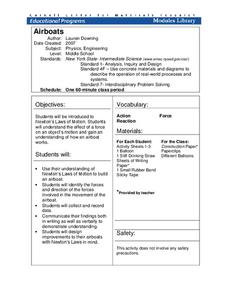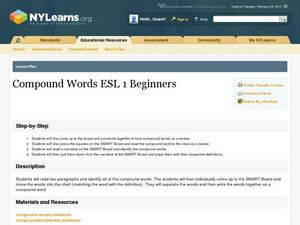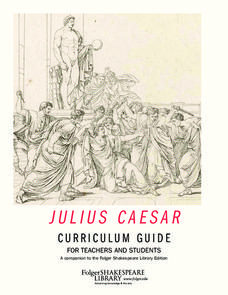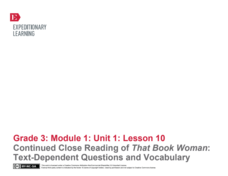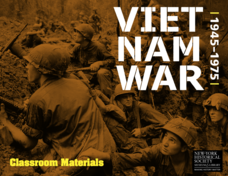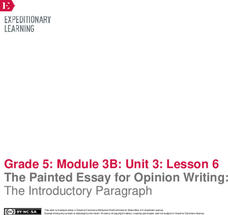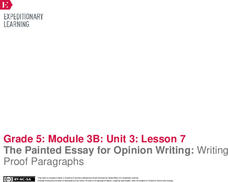Museum of Disability
Taking Down Syndrome to School
Teach your class about the ways they can befriend and understand people who are different from them with a reading comprehension lesson. As youngsters read Taking Down Syndrome to School by Jenna Glatzer, they answer a series of...
Museum of Disability
Taking Visual Impairment to School
What is the world like when you can't see, or when your vision is impaired? Learn about how Lisa communicates with the world around her with Taking Visual Impairment to School by Rita Whitman Steingold. Learners answer discussion...
Museum of Disability
Stand in My Shoes
Stand in My Shoes, a story by Bob Sornson, is an effective way to teach young learners about empathy and making friends. Once pupils read through the story, they answer a series of discussion questions and complete reading activities...
Teach Engineering
Where Are the Plastics Near Me? (Mapping the Data)
The last activity in a nine-part series has teams create a Google Earth map using the data they collected during a field trip. Using the map, groups analyze the results and make adjustments to the map to reflect their analysis. A short...
Cornell University
Polymers: Making Silly Putty
Putty is proof that learning can be fun! Share the wonderful world of polymers with your class through an experiment. Young scientists create their own silly putty, then examine its properties.
Cornell University
Airboats
Don't let the resource blow you away. Scholars build airboats from basic materials and collect data on how far the boats move. They refine their designs taking Newton's laws into consideration.
Curated OER
Avoir, Être, et Le Passé Composé
The lesson begins with direct instruction: how and when do we use avoir and être to form the past tense? After identifying the verbs that use either avoir or être, French learners write about five things they did the week prior. Then, in...
Curated OER
Sense Poetry
Access your young poets' senses and emotions with this activity, which guides them through the process of writing a "sense poem." After working on a sense poem as a class and modeling the procedure, individuals work on their own poems...
Curated OER
Compound Words ESL 1 Beginners
Bring vocabulary to life with this SMARTboard activity! With a list of (linked) compound words, learners combine each part of the word to complete the compound word. They then read a narrative and identify the compound words. The last...
Folger Shakespeare Library
Julius Caesar Curriculum Guide
Julius Caesar need not be Greek to kids. The background information and suggestions for teachers, as well as the activities for learners, make this curriculum guide a must-have for your Shakespeare curriculum library.
Curated OER
Family Forms and Family Life Cycle
There are so many different types of families, and each family functions in a different way. Discover the different roles, responsibilities, and relationships that develop in different family types. The lesson provides you with five...
EngageNY
Continued Close Reading of That Book Woman: Text-Dependent Questions and Vocabulary
Explicitly explained and delightfully detailed are two ways to describe this tenth lesson plan in a larger unit designed for the first few weeks of third grade. Learners continue to use and develop previously learned close reading...
The New York Times
Fiction or Nonfiction? Considering the Common Core's Emphasis on Informational Text
Nothing aids in comprehension more than an explanation and understanding of why things are done. Address why the Common Core requires the reading percentages that it established and analyze how this affects your readers. Learners read...
Children's Museum of Indianapolis
Anne Frank: Facing Hatred, Daring to Dream
The stories of Anne Frank, Ruby Bridges, and Ryan White illustrate the power of children to make a difference. The three lesson in this must-have resource are designed to inspire young people to make a difference in their world....
Smithsonian Institution
Students’ Response to 9/11—A Documentary Report
Young historians research the devastating attacks of 9/11 and use that information to script their own documentaries. The follow-up activity includes recording the documentary and conducting classmate interviews,
Curated OER
Lesson 9: Tracking Commodities
Over the corse of a month, small groups will monitor the price of a specific energy commodity and analyze it in relation to global and domestic events. They play a trade simulation game and create infographics showing what they've...
National Endowment for the Humanities
“Twelve Years a Slave”: Analyzing Slave Narratives
Readers of Solomon Northup's brutally frank slave narrative Twelve Years a Slave examine passages that support the argument that slavery "undermined and corrupted" the institution of marriage. Background information is provided by a...
California Polytechnic State University
Australian Geography Unit
At the heart of this resource is a beautifully detailed PowerPoint presentation (provided in PDF form) on the overall physical geography of Australia, basic facts about the country, Aboriginal history, and Australia culture and lifestyle.
New York Historical Society
The Vietnam War: 1945-1975
Do pupils know that the Vietnam War spanned a period of 30 years? A war that long is bound to leave devastating effects. Help young historians develop a comprehensive understanding of the war through multiple units on the subject that...
ReadWriteThink
Word Recognition Strategies Using Nursery Rhymes
As a class, scholars read the poems, Humpty Dumpty, Peter, Peter, Pumpkin Eater, and Jack and Jill, in order to identify words with the same ending sound. Using their rhyming skills, learners brainstorm additional words from word...
The New York Times
Understanding the Mathematics of the Fiscal Cliff
What exactly is the fiscal cliff? What are the effects of changing income tax rates and payroll tax rates? Your learners will begin by reading news articles and examining graphs illustrating the "Bush tax cuts" of 2001 and 2003. They...
National Council of Teachers of English
A Bear of a Poem: Composing and Performing Found Poetry
Scholars work collaboratively to compose a found poem from one of their favorite stories. With a finished product in hand, class members form a circle and perform their work for an audience by taking turns reciting one line till the poem...
EngageNY
The Painted Essay for Opinion Writing: The Introductory Paragraph
The answer is blowin' in the wind. Using the resource, scholars read and analyze a model essay about wind power. Next, they work in groups to write an introductory paragraph that expresses an opinion about the topic.
EngageNY
The Painted Essay for Opinion Writing: Writing Proof Paragraphs
It's time to proof read! Pupils read and analyze proof paragraphs from a model essay. They then practice writing their own proof paragraphs to express an opinion about offshore oil drilling.
Other popular searches
- State of New York
- New York State History
- New York State Government
- New York State Farming
- New York State Geography
- New York State Explorers
- New York State Indians
- New York State Math
- New York State Flag
- New York State Report
- New York State Facts
- New York State Map







